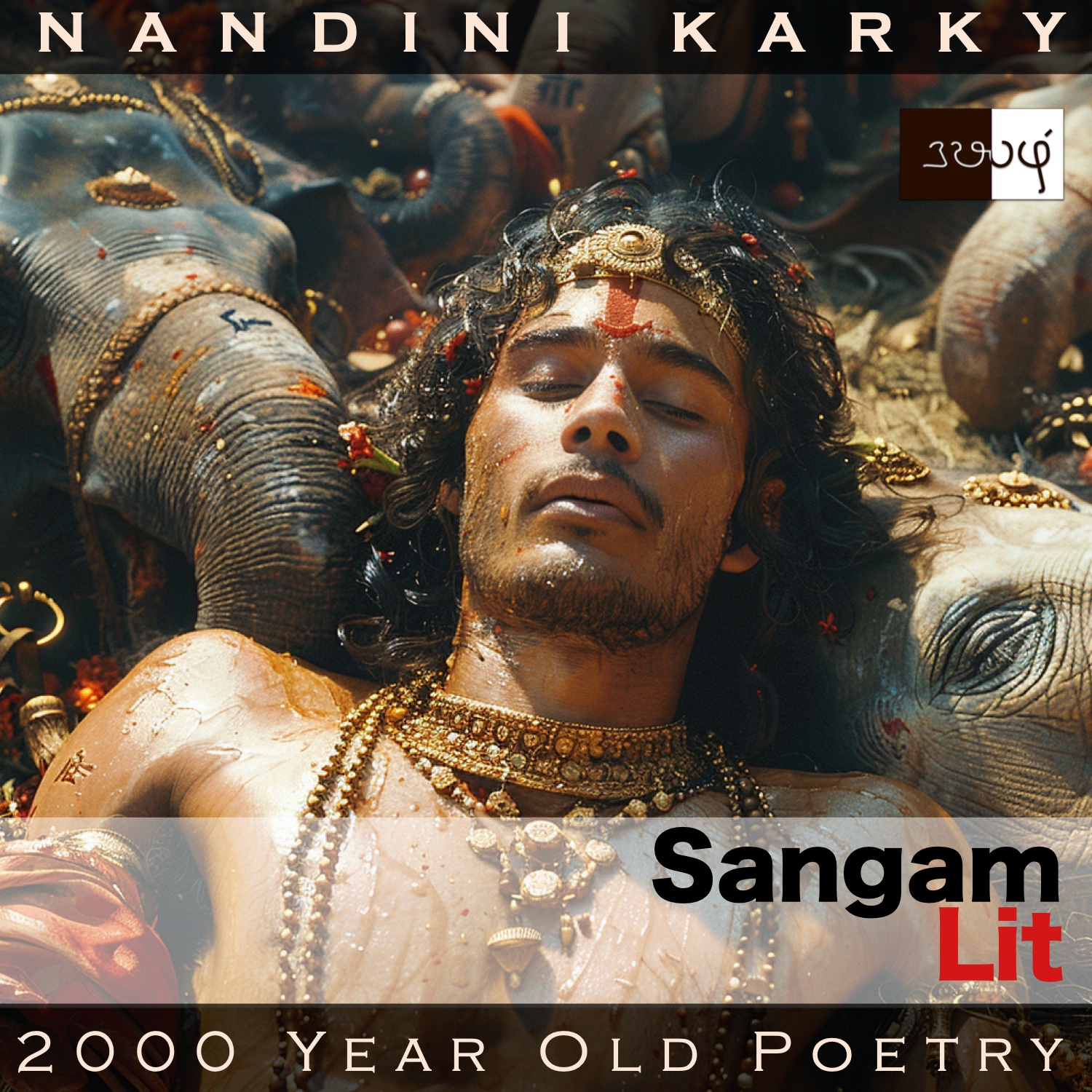Podcast: Play in new window | Download
Subscribe: Apple Podcasts | Spotify | Amazon Music | Android | iHeartRadio | TuneIn | RSS | More
In this episode, we perceive bloodshed and loss in a battlefield, as depicted in Sangam Literary work, Puranaanooru 368, penned for the Chera king Kudakko Neduncheralathan by the poet Kazhaathalaiyaar. The verse is situated in the category of ‘Vaagai Thinai’ or ‘Victory’ and talks about a king’s generosity in the midst of great strife.

களிறு முகந்து பெயர்குவம் எனினே,
ஒளிறு மழை தவிர்க்கும் குன்றம் போல,
கைம்மா எல்லாம் கணை இடத் தொலைந்தன;
கொடுஞ்சி நெடுந் தேர் முகக்குவம் எனினே;
கடும் பரி நல் மான் வாங்குவயின் ஒல்கி,
நெடும் பீடு அழிந்து, நிலம் சேர்ந்தனவே;
கொய் சுவல் புரவி முகக்குவம் எனினே,
மெய் நிறைந்த வழுவொடு பெரும்பிறிதாகி,
வளி வழக்கு அறுத்த வங்கம் போல,
குருதி அம் பெரும் புனல் கூர்ந்தனவே; ஆங்க
முகவை இன்மையின் உகவை இன்றி,
இரப்போர் இரங்கும் இன்னா வியன் களத்து,
ஆள் அழிப்படுத்த வாள் ஏர் உழவ!
கடாஅ யானைக் கால்வழி அன்ன என்
தெடாரித் தெண் கண் தெளிர்ப்ப ஒற்றி,
பாடி வந்தது எல்லாம், கோடியர்
முழவு மருள் திரு மணி மிடைந்த நின்
அரவு உறழ் ஆரம் முகக்குவம் எனவே.
We begin our exploration of a new series of songs revealing death and loss in a battlefield. The poet sings these words to this Chera King as he lies on that field, after wreaking havoc on enemy troops, his life about to part away.
“If I thought I could get elephants and part away, all those trunk-bearing beasts, akin to hills that block radiant rainclouds, have perished pierced by arrows;
If I thought I could get tall chariots with golden crowns, fine and fast horses have pounced on them, and losing their tall magnificence, these are lying on the ground;
If I thought I could obtain horses with well-trimmed manes, with their bodies brimming with scars, they have lost their life, appearing like ships without wind in the midst of that huge sea of blood;
And so, owing to the lack of any gifts to be obtained, without happiness, appears this terrible battlefield ,where supplicants seek to no avail, O sword-bearing farmer, who has stacked bodies!
As I strike against the eye of my thodari drum, akin to a wild elephant’s foot, and come singing to you, it appears as if it’s to receive that snake-like necklace adorning your fine chest, akin to the drum of a dancer!”
Time to delve into the nuances. The poet talks about how he dreamt about receiving elephants from the winning king, but all the elephants there were lying about dead, like slain mountains, pierced by arrows. He then turns his attention to chariots and says likewise he’s not going to be getting any chariots because these are lying shattered on the ground. Next, the spotlight falls on horses and he says horses are not coming home with him either, for these are lying like immobile ships without wind, in that sea of blood, covered with wounds many. Such is that terrible battlefield where there seem to be no winners and supplicants are sure to return empty-handed, adds the poet. However, even in that dire situation of his life about to part away, the Chera king seems to have wanted to give the golden chain around his neck to this poet, which makes the poet lament that his song to the accompaniment of his thodari drum, seems to have fetched him the last gift from this ruler, the snake-like chain on his beautiful chest, compared to a dancer’s drum, as his heart is echoing the last few beats of his life.
A poet’s register of a king’s poignant end. On the other hand, that matter-of-fact expectation to receive elephants, chariots and horses makes me think that perhaps it was a practice of those Sangam kings to give these gifts to poets who sang about them. Could these extend beyond mere poetic exaggeration and be facts of reality? And, what did these poets do with those animals and chariots? Leaving aside such unanswerable questions, we can see how through the images of this verse, the poet brings alive the gore of an ancient battlefield and also illustrates a Tamil king’s generosity that extended till his last breath.




Share your thoughts...